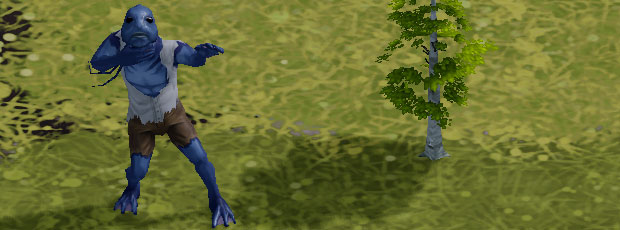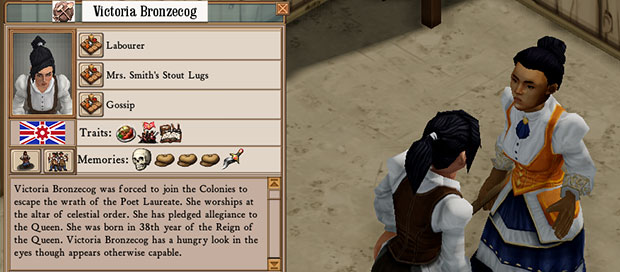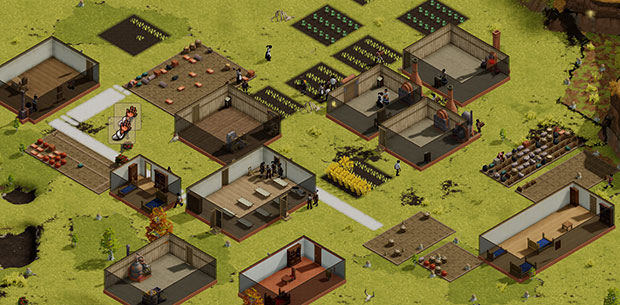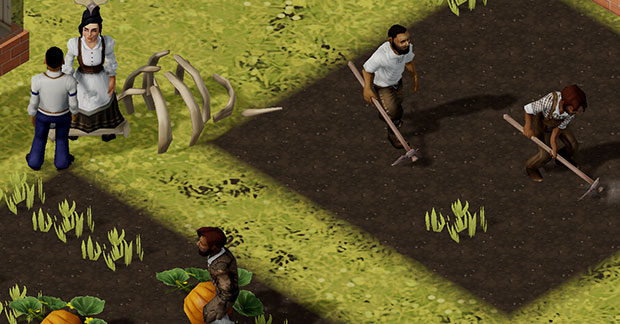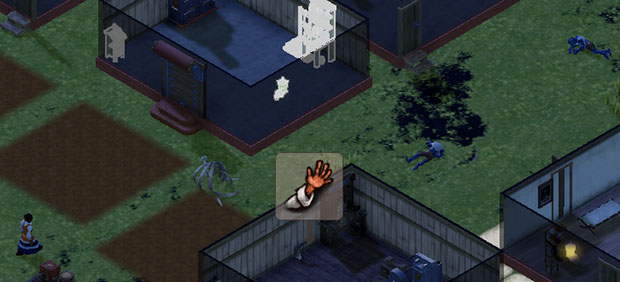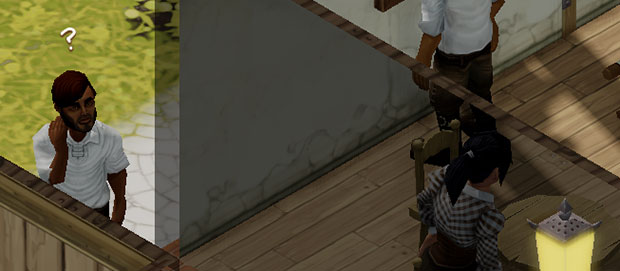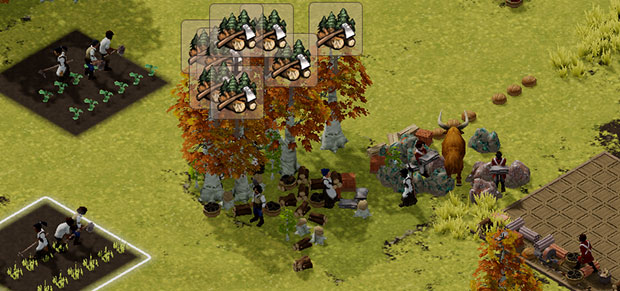Impressions: Lovecraftian Citybuilder Clockwork Empires
The Cabbage Patch Over Innsmouth
Clockwork Empires is a citybuilding/Lovecraftian survival sim from Gaslamp Games, they of the splendid Dungeons of Dredmor, in which you manage and protect Imperial colonists attempting to build a life on a new frontier. A new frontier which just so happens to contain Other Creatures. While it might be a dramatic departure from the successful roguelike that went before it, it does retain the horror-comedy tone. It arrives on Steam Early Access tomorrow, but I've been playing it for the last few days.
It does say 'Early Access' - that ubiquitous bête noire of PC gaming in 2014 - on the tin, so I must keep reminding myself of that as I struggle to reconcile what's on my screen with the wonderful things promised of Clockwork Empires back in March. Hopefully some of those delightful things will indeed come to pass in time, but right now we're looking at a barebones citybuilder with a smattering of Lovecraftpunk flavour text attached. My challenge today - other than 'wash', 'eat', 'stop slouching' and all that tedious stuff - is to try and balance what's here with what might one day be there, and then again with what I myself want to be there one day. The Early Access riddle is the hardest one to solve. It's clearer for games which manage to nail the key concept and mechanics first then add supporting features over time (a DayZ or Elite Dangerous, for example), but for something like this, which is using the gradual addition of features to build towards realising the key concept much later on, it's almost impossible to glean what the finished product may be like.
This is something like what Clockwork Empires intends to be:
Long-term, Clockwork Empires - from the makers of the sterling roguelike (oh, do stop quibbling) Dungeons of Dredmor - aims to expand into offering sorta-quests, internal intrigue and revolt, an array of Cthulian beasts and other dark forces to battle or attempt neighbourly relations with, and a detailed AI system which sees every citizen's performance and aptitudes affected by their experiences. It's important to look at their development status page, breaking down what's there and what's planned, before you read any of what I have to say, as really I'm purely tackling the 'should you buy this now?' dilemma.
Right now, the promising AI personality aspect exists in the form of icons and colourfully-written text on character sheets, but either there's no outward effect or it's so minor as to be drowned out by the day-to-day business of harvesting and building. Quite clearly, looking at the game's devlog and seeing the odd piece of debug text pop up, there's plenty going on under the hood, but it may be some time before this state of mind stuff coalesces into noticeable impacts on what your guys are up to.
The tone of it all is lovely, and perfect words like 'Stygian' and 'eldritch' abound. The owner of a simple, homely kitchen might elect to name it 'The Stygian Widowmaker' for instance. If only Gregg's had employed similar thinking. The naming stuff happens visibly, while if you want to dig deeper, brief and entirely optional villager bios tell of their hopes, fears, histories and politics.
To compare it to Sunless Sea, another alpha/beta access game which adopts a similar (if less cartoonish) Albion Horror tone, Failbetter's game presents its language and mood as you play. You will naturally pick up a sense of this place and its people, and that sense will inform how you react and which options you choose. In Clockwork Empires in its current state, you have to dig deliberately into little menus for all that stuff, and while you might well enjoy reading it and daydreaming about what kind of character the NPC who's joined a cult or seen a dead body or felt angry towards the distant monarchy is, what they might do, who they might do it to or with, right now that's going to happen.
If you do want blatant Lovecraft overtones, Fishmen occasionally stagger over and take clumsy swipes at terrified farmers, but the rest - and hopefully the best - is yet to come.
In the current build, as well as only offering a few buildings to erect and a relatively lifeless world beyond your own enclave, it's micro-management heavy, which is of greater concern than yet-to-come features. For instance, if you're looking to build a house with a bed in it, while you can draw out a blueprint in whatever silly shape you fancy, a carpentry workshop won't simply make the required planks from logs - you need to go in and specify how many logs you need, otherwise it'll sit idle. You might not even have any logs, because you need to repeatedly nominate exactly which trees need chopping down, as even a workgroup who you've set to only engage in forestry tasks won't wander off to the next copse when the current one's been felled.
Even once you have the resources you need, the build site will probably sit idle for ages, as a combination of bugs and minimal or opaque methods of diverting your settlers from whatever else is occupying them means no bugger will turn up to saw a plank.
Eventually, someone will finish up their other tasks - and often their tasks are being idle, as personal needs are met, which is something I hope is more illuminated in future builds - go saw logs into planks, then someone else will go carry those planks to the storage zone. Then someone else will collect those planks and carry them to the new house. Then they may or many not construct them into a bed. At each of these stages is a whole lot of uncertain waiting, and while much of this comes down to villagers being engaged with earlier orders that you gave either sensibly or recklessly, the lack of any current facility to prioritise or cancel tasks means heroic patience is the only option available. (Job priority/cancel buttons are in there, but they don't work as yet).
I ended up running Clockwork Empires in the background half the time, like Mountain, checking in every 20 minutes or so to see if anything had built yet or that no-one was starving to death. It kind of worked that way, but I'm pretty sure that's not how it's intended to be played.
The reliance on manually tagging everything, from which berries you're going to forage to exactly how many bricks you want your ceramics workshop to pump out, does trouble me on a deeper level, and I pray there'll eventually be options to automate certain tasks so that it isn't an exhausting click/drag fest. I know that games focused around a constant search for food remain very much in vogue, but dragging a box around some lingonberries every quarter of an hour is perhaps not in the same boat. The lessons of the appalling Godus must be learned, and learned well.
Which, of course, sounds like a big old moan, but none of this is some damning judgement on whatever the game eventually intends to be (though, of course, it may or may not become that). All I'm saying is that right now, in this infant form, it's fairly tricky to find the good times amongst all the hanging around and hard graft. Turn up because you want to support the devs or you want to watch a leftfield citybuilder evolve and grow over time, not because you want to sit down and lose yourself in building your own little world. It doesn't even have savegame support yet, for instance.
HOWEVER. It looks lovely. The writing is full of lovely words and phrases. Watching tiny redcoats try to shoot tiny fishmen is lovely. The basic structure of resources/economy - clay becomes bricks, coal becomes charcoal, wheat becomes beer - is logical and gently engaging without being over familiar. Everything the devs have promised sounds clever and appealing. Aesthetic and atmosphere - there's some great, unsettling music too - are in place. This is without a question a game I want to see more of.
In its long journey to 'full' release, Clockwork Empires has two big challenges on its scaly hands, as I see it. One is to make its NPCs genuinely mean something more than a means with which to gather wood, construct buildings or gun down occasional mermen. The other is to polish up the nuts and bolts of resource gathering and settlement growth, so that even if you do find yourself speeding towards certain doom by starvation or disgruntled populace or fishguy invasion, it's down to broader strategic failure on your part rather than because you didn't click the same icons over and over.
I'm doing the armchair designer thing again, I realise. Sorry. I'm just hoping that, based on everything that's been said before, and on the dev's track record of playfulness, oddness and unpredictability as well as gentle brutality, we're not just on course to have a cuter, fiddlier Banished. Which is not to defame Banished or open old wounds, but rather to say that Clockwork Empires seems to have its eyes on a different prize, and while it's not anything like close to it yet, I sincerely hope it does reach it.
Clockwork Empires arrives on Steam Early Access tomorrow, but you can buy 'Earliest Access' direct from the devs right now, if you like.


